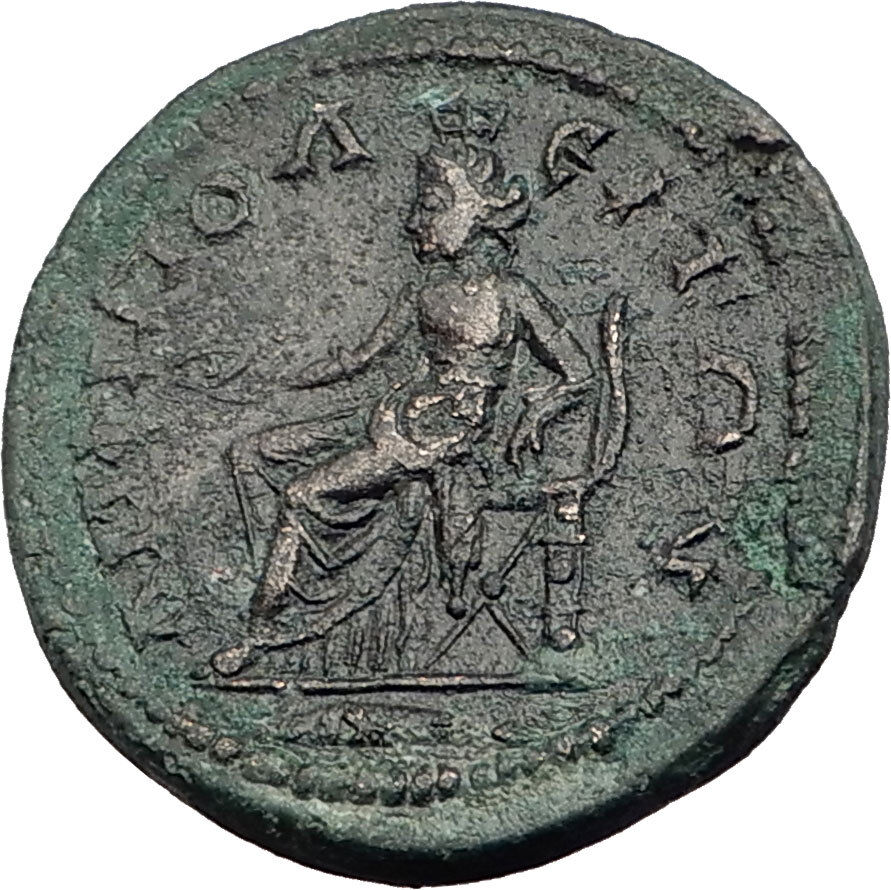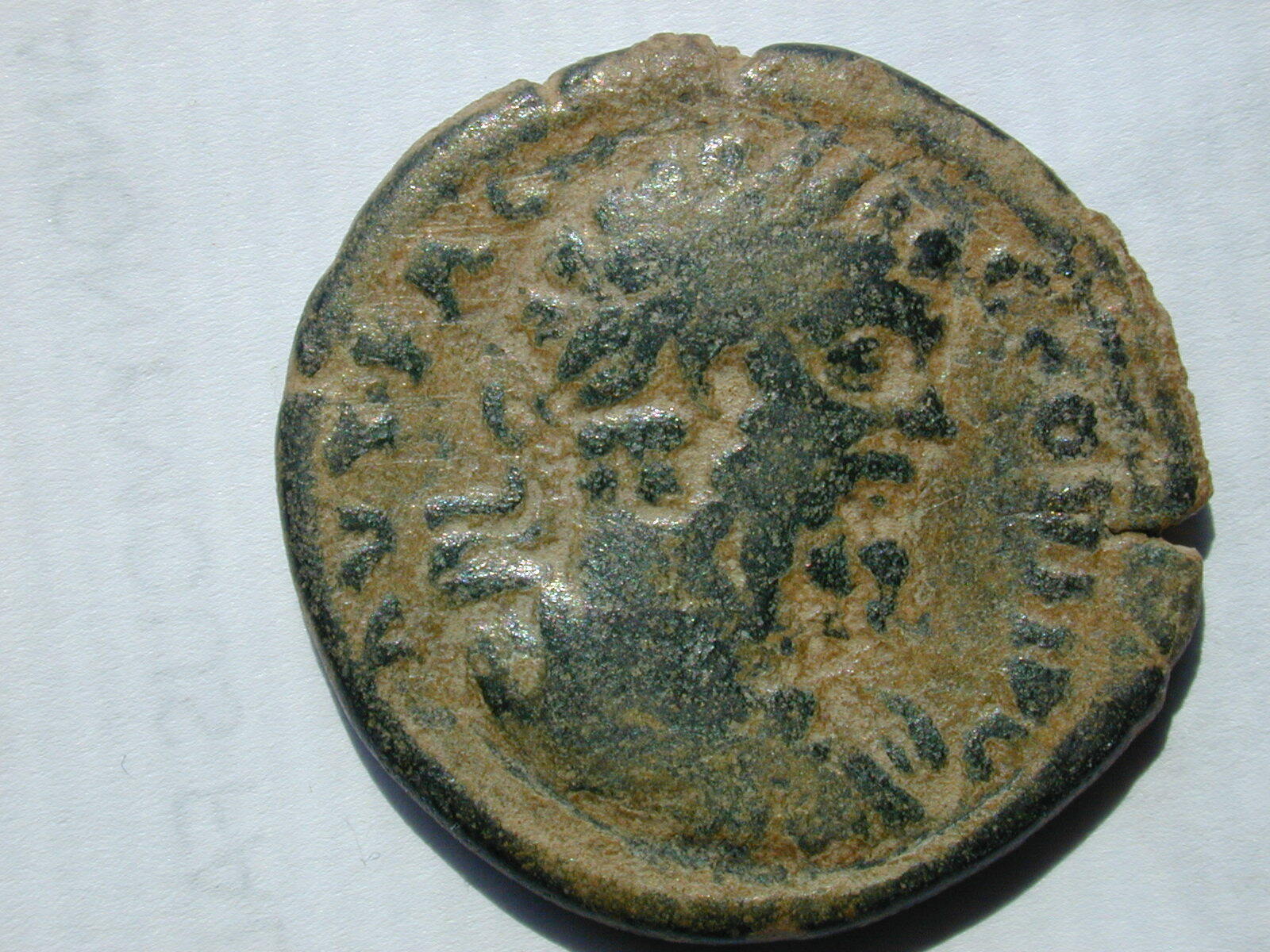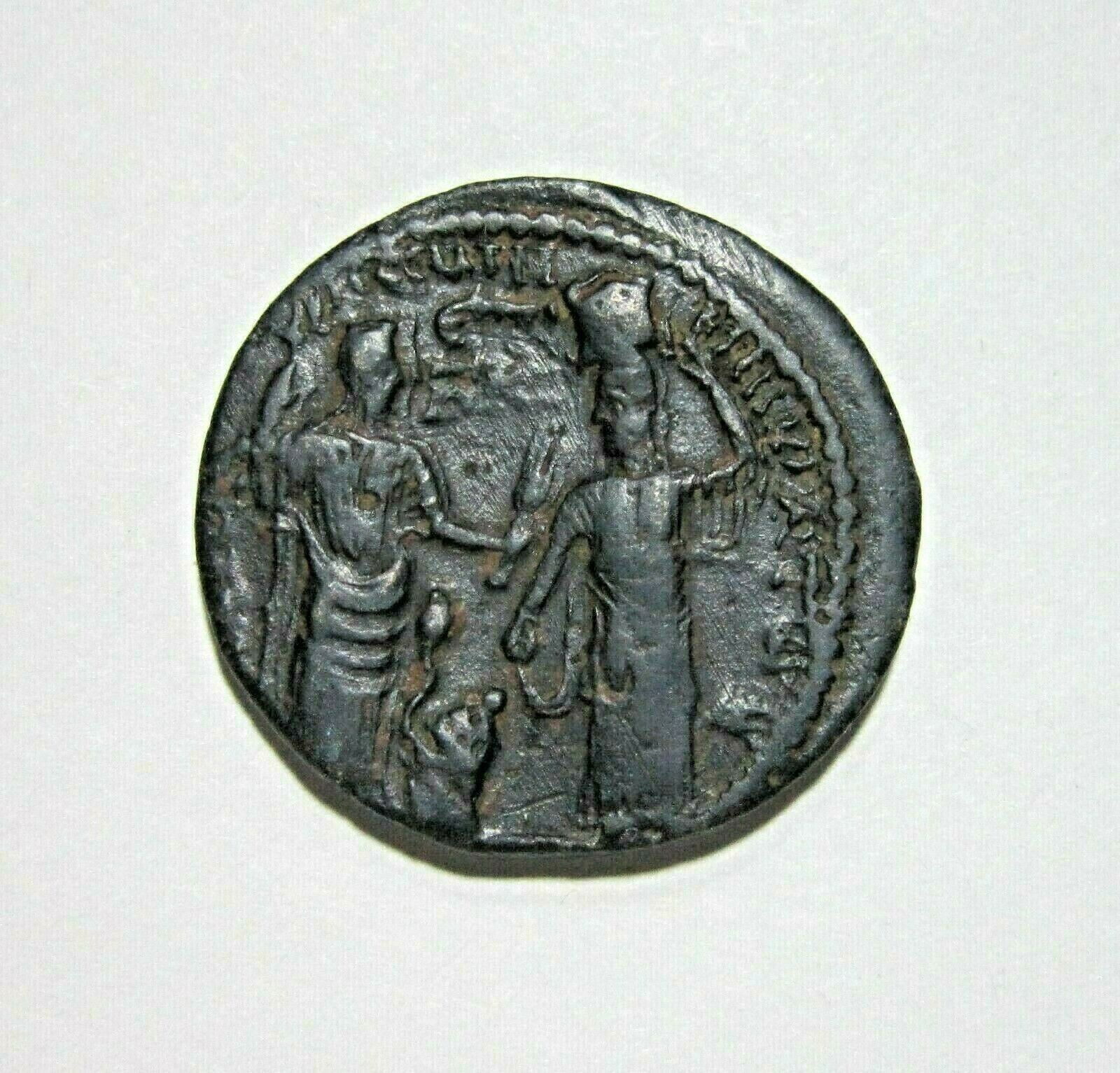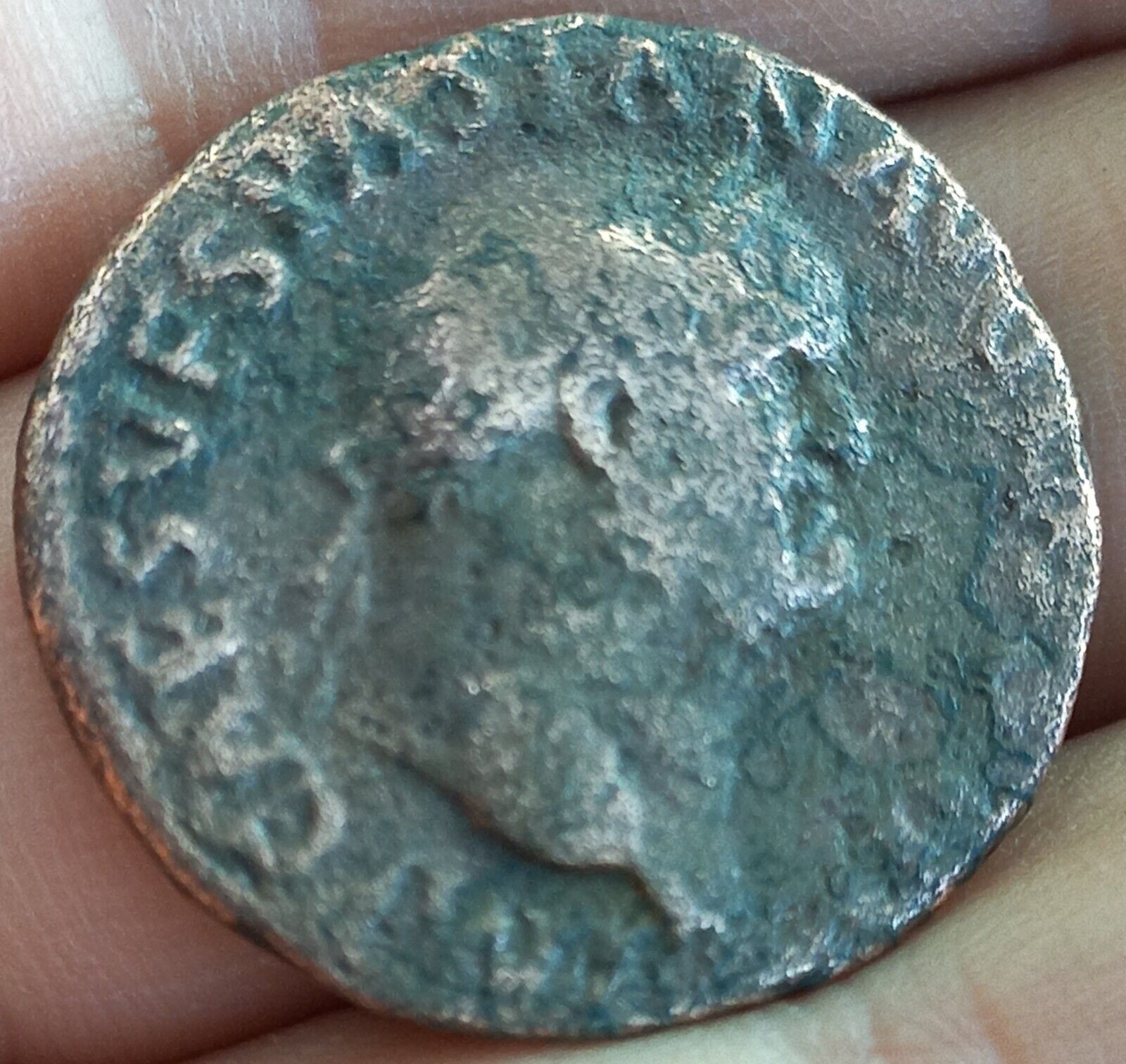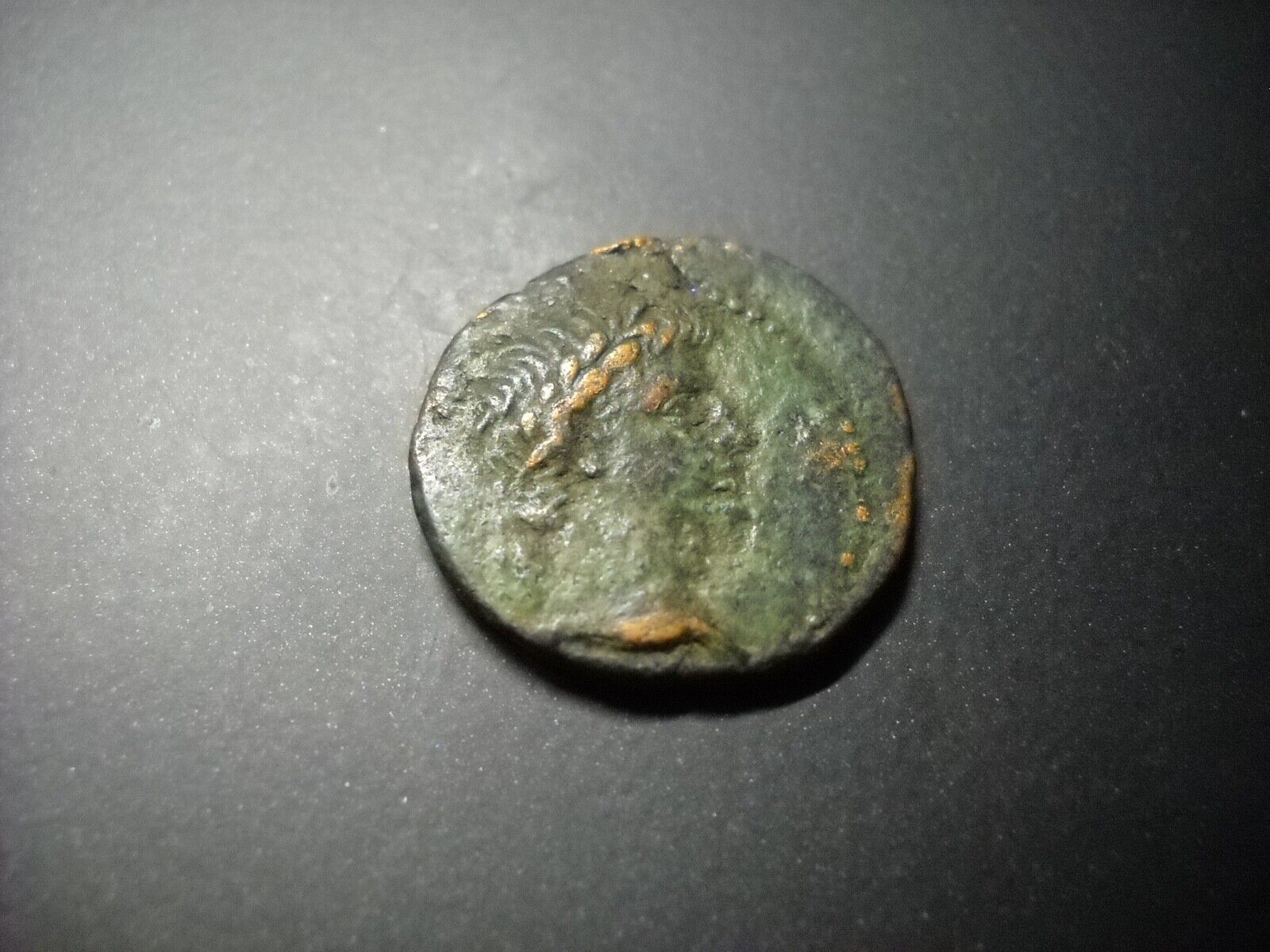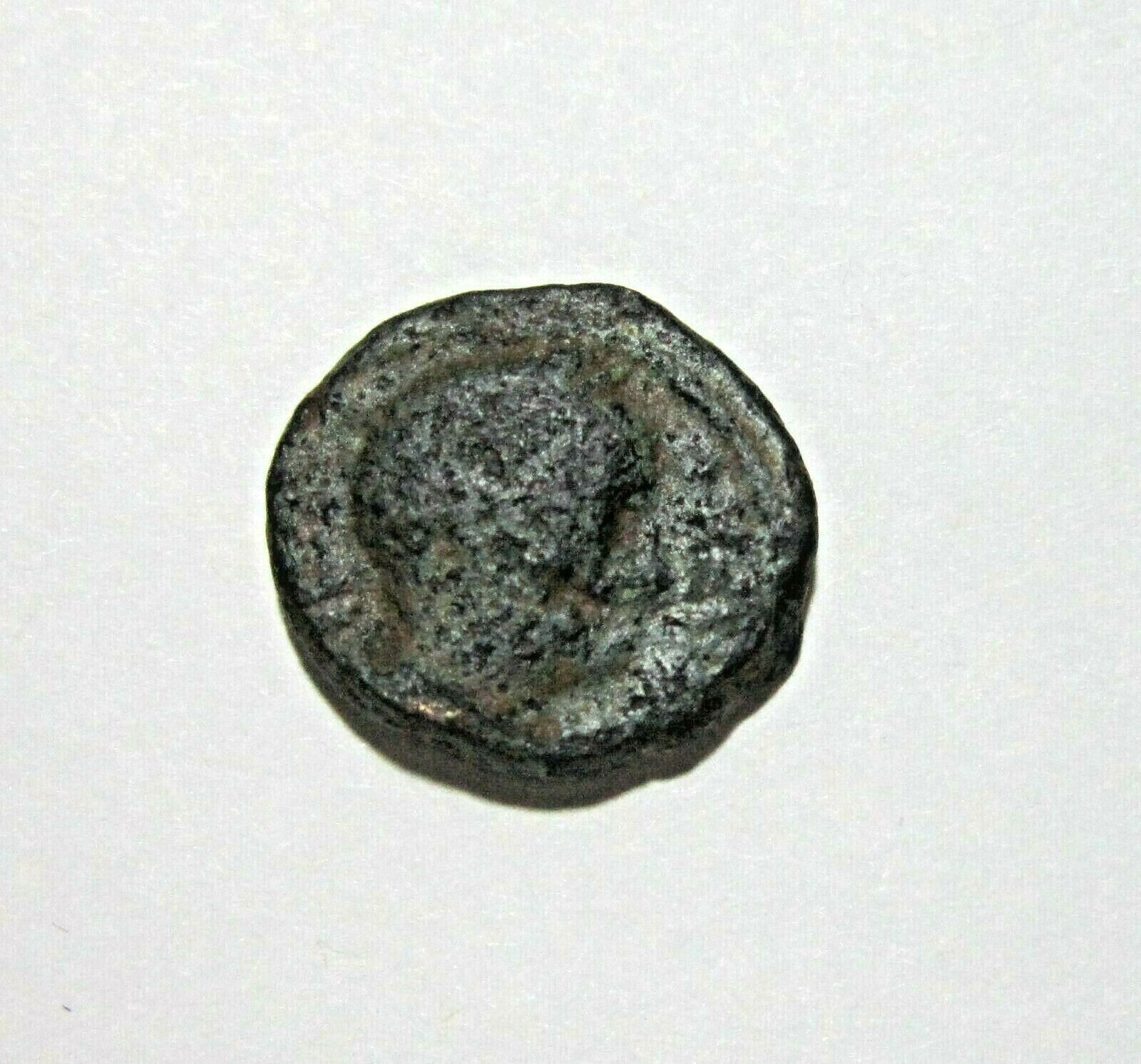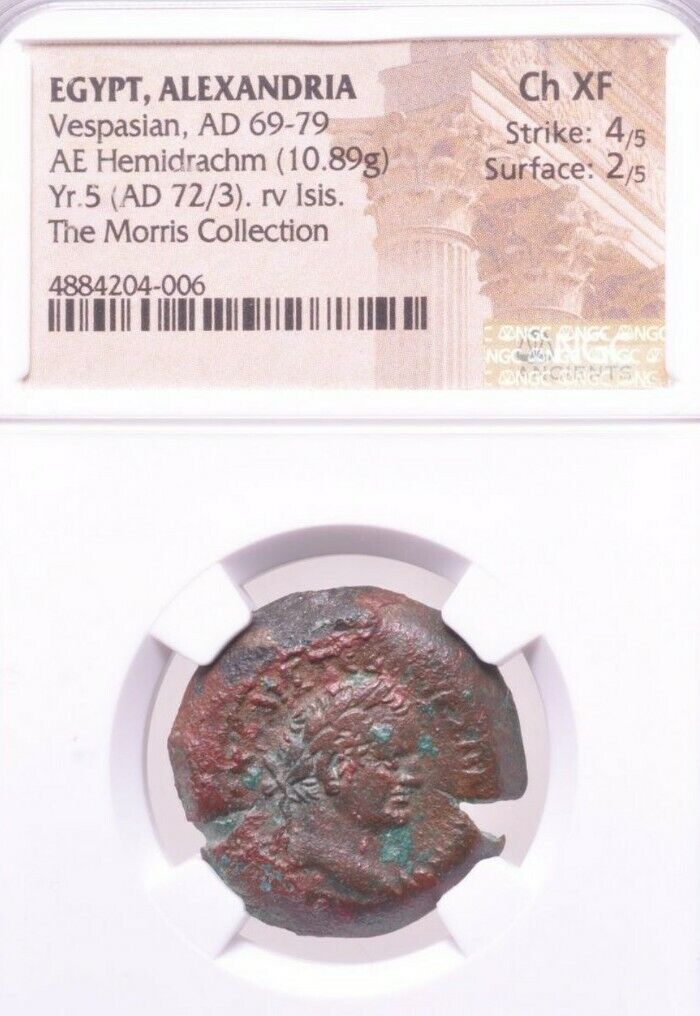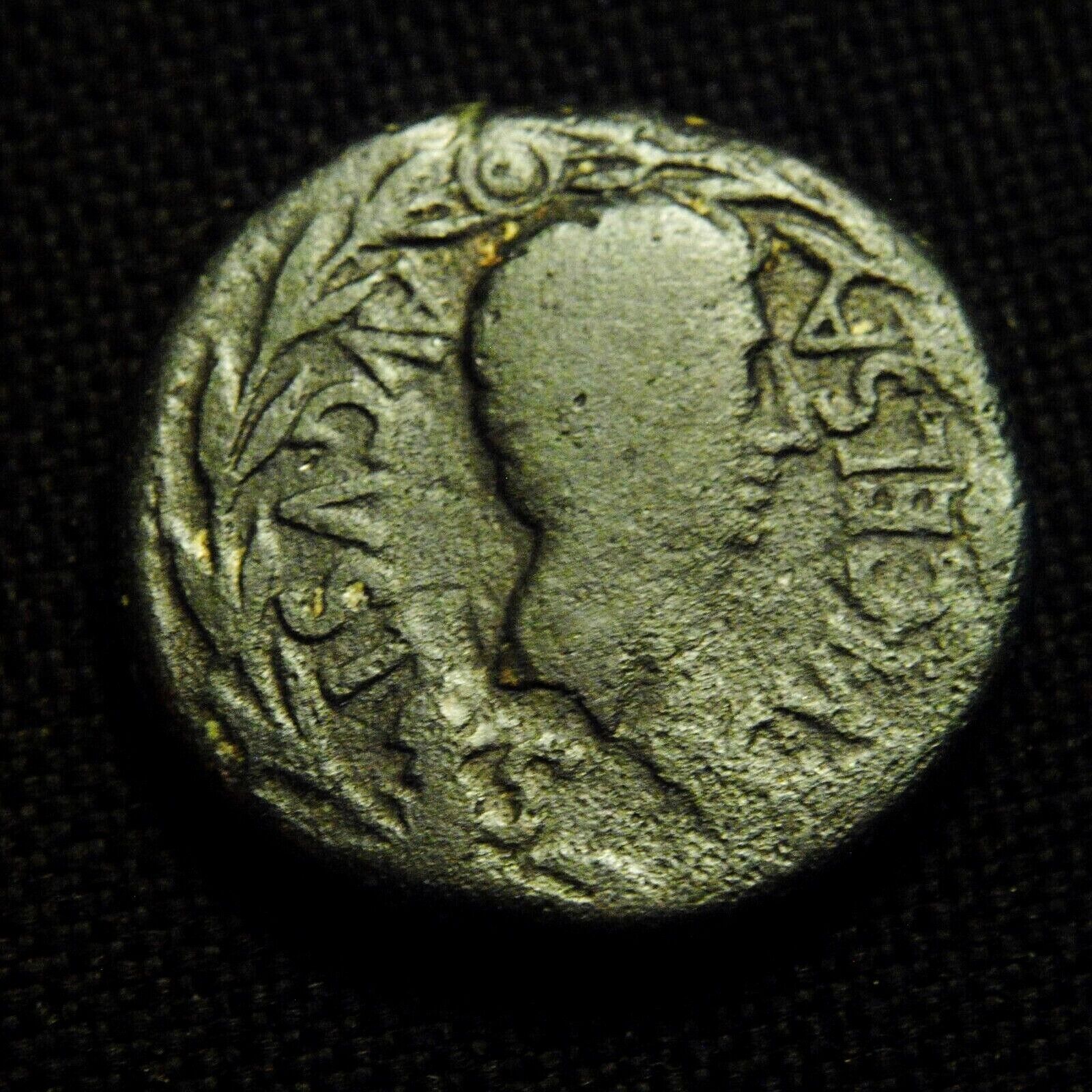-40%
Antoninus Pius Marcus Aurelius Father Ancient Roman Coin Nude Mars Ares i28093
$ 43.92
- Description
- Size Guide
Description
Item:i28093
Authentic Ancient Coin of:
Antoninus Pius - Roman Emperor: 138-161 A.D.
Bronze 19mm (3.70 grams) of Hadrianopolis in Trace circa 138-161 A.D.
Bare head right.
Mars/Ares standing left, nude, wearing helmet and holding spear.
You are bidding on the exact item pictured, provided with a Certificate of Authenticity and Lifetime Guarantee of Authenticity.
Mars
was the
Roman
god of war
, the son of
Juno
and
Jupiter
, husband of
Bellona
, and the lover of
Venus
. He was the most prominent of the
military
gods that were
worshipped by the
Roman legions
. The martial Romans considered him second in importance only to Jupiter (their main god). His
festivals
were held in
March
(named for him) and October. As the word
Mars
has no
Indo-European
derivation, it is most likely the
Latinised
form of the agricultural
Etruscan
god
Maris
. Initially Mars was a Roman god of
fertility
and
vegetation
and a protector of cattle, fields and boundaries and farmers. In the second century BC, the conservative
Cato the Elder
advised "For your cattle, for them to be healthy, make this sacrifice to Mars Silvanus you must make this sacrifice each year". Mars later became associated with battle as the growing
Roman Empire
began to expand, and he came to be identified with the
Greek
god
Ares
. Unlike his Greek counterpart, Mars was generally revered and rivaled Jupiter as the most honoured god. He was also the
tutelary
god of the city of Rome. As he was regarded as the legendary father of Rome's founder,
Romulus
, it was believed that all Romans were descendants of Mars.
Ares
is the
Greek god
of war
. He is one of the
Twelve Olympians
, and the son of
Zeus
and
Hera
. In a title="Ancient Greek literature" href="https://en.wikipedia.org/wiki/Ancient_Greek_literature">
Greek literature
, he often represents the physical or violent aspect of war, in contrast to the armored
Athena
, whose functions as a
goddess of intelligence
include
military strategy
and
generalship
.
The Greeks were
ambivalent
toward Ares: although he embodied the physical valor necessary for success in war, he was a dangerous force, "overwhelming, insatiable in battle, destructive, and man-slaughtering." Fear
(
Phobos
)
and Terror
(
Deimos
)
were yoked to his battle
chariot
. In the
Iliad
his father Zeus tells him that he is the god most hateful to him. An association with Ares endows places and objects with a savage, dangerous, or militarized quality. His value as a war god is even placed in doubt: during the
Trojan War
, Ares was on the losing side, while Athena, often depicted in
Greek art
as holding
Nike (Victory)
in her hand, favored the triumphant Greeks.
Ares plays a relatively limited role in
Greek mythology
as represented in literary narratives, though his numerous love affairs and abundant offspring are often
alluded
to. When Ares does appear in myths, he typically faces humiliation. He is well known as the lover of
Aphrodite
, the goddess of love who was married to
Hephaestus
, god of craftsmanship,
[10]
but the most famous story involving the couple shows them exposed to ridicule through the wronged husband's clever device.
The counterpart of Ares among the
Roman gods
is
Mars
, who as a father of the Roman people held a more important and dignified place in
ancient Roman religion
for his agricultural and
tutelary
functions. During the
Hellenization
of
Latin literature
, the myths of Ares were
reinterpreted
by Roman writers under the name of Mars. Greek writers under
Roman rule
also recorded
cult practices
and beliefs pertaining to Mars under the name of Ares. Thus in the
classical tradition
of later
Western art and literature
, the mythology of the two figures becomes virtually indistinguishable.
Names and epithets
The etymology of the name
Ares
is traditionally connected with the
Greek
word
ἀρή
(
arē
), the
Ionic
form of the
Doric
ἀρά
(
ara
), "bane, ruin, curse, imprecation".
[12]
There may also be a connection with the Roman god of war
Mars
, via hypothetical
Proto-Indo-European
*
M̥rēs
;
[
citation needed
]
compare Ancient Greek
μάρναμαι
(
marnamai
), "to fight, to battle", or Punjabi
maarna
(to kill, to hit).
[13]
The earliest attested form of the name is the
Mycenaean Greek
a-re
, written in
Linear B
syllabic script.
[14]
Walter Burkert
notes that "Ares is apparently an ancient abstract noun meaning throng of battle, war."
[15]
The
adjectival
epithet
Areios
was frequently appended to the names of other gods when they take on a warrior aspect or become involved in warfare:
Zeus Areios
,
Athena Areia
, even
Aphrodite Areia
. In the
Iliad
, the word
ares
is used as a
common noun
synonymous with "battle."
Inscriptions as early as
Mycenaean
times, and continuing into the
Classical period
, attest to
Enyalios
, another name for the god of war.
Character and origins
Ares was one of the Twelve Olympians in the archaic tradition represented by the
Iliad
and
Odyssey
, but Zeus expresses a recurring Greek revulsion toward the god when Ares returns wounded and complaining from the
battlefield at Troy
:
Then looking at him darkly Zeus who gathers the clouds spoke to him:
'Do not sit beside me and whine, you double-faced liar.
To me you are the most hateful of all gods who hold Olympos.
Forever quarrelling is dear to your heart, wars and battles.
…
And yet I will not long endure to see you in pain, since
you are my child, and it was to me that your mother bore you.
But were you born of some other god and proved so ruinous
long since you would have been dropped beneath the gods of the bright sky."
[16]
This ambivalence is expressed also in the god's association with the
Thracians
, who were regarded by the Greeks as a barbarous and warlike people.
[17]
Thrace
was Ares' birthplace, true home, and refuge after the affair with Aphrodite was exposed to the general mockery of the other gods.
[18]
A late 6th-century BC funerary inscription from
Attica
emphasizes the consequences of coming under Ares' sway:
Stay and mourn at the tomb of dead Kroisos
Whom raging Ares destroyed one day, fighting in the foremost ranks.
[19]
In
Macedonia
, however, he was viewed as a bearded war veteran with superb military skills and physical strength. The
ancient Macedonians
looked up to Ares as a divine leader as well as a god.
[
citation needed
]
In
Sparta
Ares was viewed as a
masculine
soldier in which his resilience, physical strength and military intelligence was unrivaled.
[
citation needed
]
Attributes
The
Ares Borghese
The birds of Ares (
Ornithes Areioi
) were a flock of feather-dart-dropping birds that guarded the
Amazons
' shrine of the god on a
coastal
island
in the
Black Sea
.
[20]
Vultures and dogs, both of which prey upon carrion in the battlefield, were
sacred
to him.
[
citation needed
]
Cult and ritual
Although Ares received occasional sacrifice from armies going to war, the god had a formal temple and cult at only a few sites.
[21]
At
Sparta
, however, youths each sacrificed a puppy to
Enyalios
before engaging in ritual fighting at the Phoebaeum.
[22]
The
chthonic
night-time sacrifice of a dog to Enyalios became assimilated to the cult of Ares.
[
citation needed
]
Just east of Sparta stood an archaic statue of the god in chains, to show that the spirit of war and victory was never to leave the city.
[23]
The
temple
to Ares in the
agora
of
Athens
that
Pausanias
saw in the second century AD had only been moved and rededicated there during the time of
Augustus
; in essence it was a
Roman temple
to the Augustan
Mars Ultor
.
[21]
The
Areopagus
, the "mount of Ares" where
Paul of Tarsus
preached, is sited at some distance from the Acropolis; from archaic times it was a site of trials. Its connection with Ares, perhaps based on a false etymology, is purely
etiological myth
.
[
citation needed
]
A second temple has also been located at the archaeological site of
Metropolis
in what is now Western
Turkey
.
[
citation needed
]
Attendants
Deimos
, "Terror" or "Dread", and
Phobos
, "Fear", are his companions in war
[24]
and also his children, borne by
Aphrodite
, according to
Hesiod
.
[25]
The sister
[
citation needed
]
and companion of the violent Ares is
Eris
, the goddess of discord, or
Enyo
, the goddess of war, bloodshed, and violence. Enyalius, rather than another name for Ares, in at least one tradition was his son by Enyo.
[26]
Ares may also be accompanied by
Kydoimos
, the demon of the din of battle; the
Makhai
("Battles"); thev "Hysminai" ("Acts of manslaughter");
Polemos
, a minor spirit of war, or only an epithet of Ares, since it has no specific dominion; and Polemos's daughter,
Alala
, the
goddess
or
personification
of the Greek war-cry, whose name Ares uses as his own war-cry. Ares's sister
Hebe
, "Youth," also draws baths for him.
According to
Pausanias
, local inhabitants of
Therapne
,
Sparta
, recognized
Thero
"feral, savage" as a nurse of Ares.
Founding of Thebes
One of the roles of Ares that was sited in mainland Greece itself was in the
founding myth
of Thebes: Ares was the progenitor of the water-dragon slain by
Cadmus
, for the dragon's teeth were sown into the ground as if a crop and sprung up as the fully armored
autochthonic
Spartoi
. To propitiate Ares, Cadmus took as a bride
Harmonia
, daughter of Ares' union with Aphrodite, thus harmonizing all strife and founding the city of Thebes.
[28]
Consorts and children
The
Areopagus
as viewed from the
Acropolis
.
The union of Ares and Aphrodite created the gods
Eros
,
Anteros
,
Phobos
,
Deimos
,
Harmonia
, and
Adrestia
. While Eros and Anteros' godly stations favored their mother, Adrestia by far preferred to emulate her father, often accompanying him to war.
[
citation needed
]
Ares, upon one occasion, incurred the anger of
Poseidon
by slaying his son
Halirrhothius
, who had raped Alcippe, another daughter of the war-god. For this deed, Poseidon summoned Ares to appear before the tribunal of the Olympic gods, which was held upon a hill in Athens. Ares was acquitted, and this event is supposed to have given rise to the name
Areopagus
(or Hill of Ares), which afterward became famous as a court of justice.
[29]
There are accounts of a son of Ares,
Cycnus
(Κύκνος) of
Macedonia
, who was so murderous that he tried to build a temple with the skulls and the bones of travellers.
Heracles
slaughtered this abominable monstrosity, engendering the wrath of Ares, whom the hero wounded
Edirne
(ancient
Hadrianopolis
) is a city in
Thrace
, the westernmost part of
Turkey
, close to the borders with
Greece
and
Bulgaria
. Edirne served as the capital city of the
Ottoman Empire
from 1365 to 1457, when
Constantinople
(
Istanbul
) became the empire's new capital. At present, Edirne is the capital of the
Edirne Province
in
Turkish Thrace
. The city's estimated population in 2002 was 128,400, up from 119,298 in 2000. It has
consulates
of Bulgaria,
Germany
(Honorary), Greece,
Romania
(Honorary) and
Slovakia
(Honorary). Its sister cities are
Haskovo
and
Yambol
in
Bulgaria
and
Alexandroupoli
in
Greece
.
The city was founded as
Hadrianopolis
, named for the Roman Emperor
Hadrian
. This name is still used in the
Modern Greek
(Αδριανούπολη). The
English
name
Adrianople
, by which the city was known until the Turkish Postal Service Law of 1930, has fallen into disuse. The
Turkish
Edirne
, the
Bulgarian
Одрин
(Odrin), and the Serbian
Једрене
(Jedrene) are adapted forms of the name
Hadrianopolis
.
Titus Aurelius Fulvus Boionius Arrius Antoninus
(19 September 86 – 7 March 161), generally known in English as
Antoninus Pius
was
Roman emperor
from 138 to 161. He was the fourth of the
Five Good Emperors
and a member of the
Aurelii
. He did not possess the
sobriquet
"
Pius
" until after his accession to the throne. Almost certainly, he earned the name "Pius" because he compelled the
Senate
to deify his adoptive father
Hadrian
; the
Historia Augusta
, however, suggests that he may have earned the name by saving senators sentenced to death by Hadrian in his later years.
//
He was the son and only child of
Titus Aurelius Fulvus
,
consul
in 89 whose family came from
Nemausus
(modern
Nîmes
) and was born near
Lanuvium
and his mother was Arria Fadilla. Antoninus’ father and paternal grandfather died when he was young and he was raised by
Gnaeus Arrius Antoninus
, his maternal grandfather, a man of integrity and culture and a friend of
Pliny the Younger
. His mother married to Publius Julius Lupus (a man of consular rank),
Suffect Consul
in 98, and bore him a daughter called Julia Fadilla.
As a private citizen between 110 and 115, he married Annia Galeria
Faustina the Elder
. They had a very happy marriage. She was the daughter of consul
Marcus Annius Verus
and
Rupilia
Faustina (a half-sister to Roman Empress
Vibia Sabina
). Faustina was a beautiful woman, renowned for her wisdom. She spent her whole life caring for the poor and assisting the most disadvantaged Romans.
Having filled with more than usual success the offices of
quaestor
and
praetor
, he obtained the consulship in 120; he was next appointed by the Emperor
Hadrian
as one of the four
proconsuls
to administer
Italia
, then greatly increased his reputation by his conduct as
proconsul
of
Asia
. He acquired much favor with the Emperor Hadrian, who adopted him as his son and successor on 25 February, 138, after the death of his first adopted son
Lucius Aelius
, on the condition that Antoninus would in turn adopt Marcus Annius Verus, the son of his wife's brother, and Lucius, son of Aelius Verus, who afterwards became the emperors
Marcus Aurelius
and
Lucius Verus
(colleague of Marcus Aurelius).
Emperor
On his accession, Antoninus' name became "Imperator Caesar Titus Aelius Hadrianus Antoninus Augustus Pontifex Maximus". One of his first acts as Emperor was to persuade the
Senate
to grant divine honours to Hadrian, which they had at first refused; his efforts to persuade the Senate to grant these honours is the most likely reason given for his title of
Pius
(dutiful in affection; compare
pietas
). Two other reasons for this title are that he would support his aged father-in-law with his hand at Senate meetings, and that he had saved those men that Hadrian, during his period of ill-health, had condemned to death. He built temples, theaters, and mausoleums, promoted the arts and sciences, and bestowed honours and financial rewards upon the teachers of
rhetoric
and
philosophy
.
In marked contrast to his predecessors
Trajan
and
Hadrian
, Antoninus was not a military man. One modern scholar has written "It is almost certain not only that at no time in his life did he ever see, let alone command, a Roman army, but that, throughout the twenty-three years of his reign, he never went within five hundred miles of a legion".
[2]
His reign was the most peaceful in the entire history of the
Principate
; while there were several military disturbances throughout the Empire in his time, in
Mauretania
,
Iudaea
, and amongst the
Brigantes
in
Britannia
, none of them are considered serious. The unrest in Britannia is believed to have led to the construction of the
Antonine Wall
from the
Firth of Forth
to the
Firth of Clyde
, although it was soon abandoned. He was virtually unique among emperors in that he dealt with these crises without leaving Italy once during his reign, but instead dealt with provincial matters of war and peace through their governors or through imperial letters to the cities such as Ephesus (of which some were publicly displayed). This style of government was highly praised by his contemporaries and by later generations.
Of the public transactions of this period we have scant information, but, to judge by what we possess, those twenty-two years were not remarkably eventful in comparison to those before and after his; the surviving evidence is not complete enough to determine whether we should interpret, with older scholars, that he wisely curtailed the activities of the Roman Empire to a careful minimum, or perhaps that he was uninterested in events away from Rome and
Italy
and his inaction contributed to the pressing troubles that faced not only Marcus Aurelius but also the emperors of the third century. German historian Ernst Kornemann has had it in his Römische Geschichte [2 vols., ed. by H. Bengtson, Stuttgart 1954] that the reign of Antoninus comprised "a succession of grossly wasted opportunities," given the upheavals that were to come. There is more to this argument, given that the Parthians in the East were themselves soon to make no small amount of mischief after Antoninus' passing. Kornemann's brief is that Antoninus might have waged preventive wars to head off these outsiders.
Scholars place Antoninus Pius as the leading candidate for fulfilling the role as a friend of Rabbi
Judah the Prince
. According to the
Talmud
(Avodah Zarah 10a-b), Rabbi Judah was very wealthy and greatly revered in Rome. He had a close friendship with "Antoninus", possibly Antoninus Pius, who would consult Rabbi Judah on various worldly and spiritual matters.
After the longest reign since Augustus (surpassing
Tiberius
by a couple of months), Antoninus died of fever at
Lorium
in
Etruria
, about twelve miles (19 km) from Rome, on 7 March 161, giving the keynote to his life in the last word that he uttered when the
tribune
of the night-watch came to ask the password—"aequanimitas" (equanimity). His body was placed in
Hadrian's mausoleum
, a
column
was dedicated to him on the
Campus Martius
, and the
temple
he had built in the Forum in 141 to his deified wife Faustina was rededicated to the deified Faustina and the deified Antoninus.
Historiography
The only account of his life handed down to us is that of the
Augustan History
, an unreliable and mostly fabricated work. Antoninus is unique among Roman emperors in that he has no other biographies. Historians have therefore turned to public records for what details we know.
In later scholarship
Antoninus in many ways was the ideal of the landed gentleman praised not only by ancient Romans, but also by later scholars of classical history, such as
Edward Gibbon
or the author of the article on Antoninus Pius in the ninth edition of the Encyclopedia Britannicaca:
A few months afterwards, on Hadrian's death, he was enthusiastically welcomed to the throne by the Roman people, who, for once, were not disappointed in their anticipation of a happy reign. For Antoninus came to his new office with simple tastes, kindly disposition, extensive experience, a well-trained intelligence and the sincerest desire for the welfare of his subjects. Instead of plundering to support his prodigality, he emptied his private treasury to assist distressed provinces and cities, and everywhere exercised rigid economy (hence the nickname κυμινοπριστης "cummin-splitter"). Instead of exaggerating into treason whatever was susceptible of unfavorable interpretation, he spurned the very conspiracies that were formed against him into opportunities for demonstrating his clemency. Instead of stirring up persecution against the Christians, he extended to them the strong hand of his protection throughout the empire. Rather than give occasion to that oppression which he regarded as inseparable from an emperor's progress through his dominions, he was content to spend all the years of his reign in Rome, or its neighborhood.
Frequently Asked d Questions
How long until my order is shipped?
Depending on the volume of sales, it may take up to 5 business days for shipment of your order after the receipt of payment.
How will I know when the order was shipped?
After your order has shipped, you will be left positive feedback, and that date should be used as a basis of estimating an arrival date.
After you shipped the order, how long will the mail take?
USPS First Class mail takes about 3-5 business days to arrive in the U.S., international shipping times cannot be estimated as they vary from country to country. I am not responsible for any USPS delivery delays, especially for an international package.
What is a certificate of authenticity and what guarantees do you give that the item is authentic?
Each of the items sold here, is provided with a Certificate of Authenticity, and a Lifetime Guarantee of Authenticity, issued by a world-renowned numismatic and antique expert that has identified over 10000 ancient coins and has provided them with the same guarantee. You will be quite happy with what you get with the COA; a professional presentation of the coin, with all of the relevant information and a picture of the coin you saw in the listing.
Compared to other certification companies, the certificate of authenticity is a -50 value. So buy a coin today and own a piece of history, guaranteed.
Is there a money back guarantee?
I offer a 30 day unconditional money back guarantee. I stand behind my coins and would be willing to exchange your order for either store credit towards other coins, or refund, minus shipping expenses, within 30 days from the receipt of your order. My goal is to have the returning customers for a lifetime, and I am so sure in my coins, their authenticity, numismatic value and beauty, I can offer such a guarantee.
Is there a number I can call you with questions about my order?
You can contact me directly via ask seller a question and request my telephone number, or go to my About Me Page to get my contact information only in regards to items purchased on eBay.
When should I leave feedback?
Once you receive your order, please leave a positive. Please don't leave any negative feedbacks, as it happens many times that people rush to leave feedback before letting sufficient time for the order to arrive. Also, if you sent an email, make sure to check for my reply in your messages before claiming that you didn't receive a response. The matter of fact is that any issues can be resolved, as reputation is most important to me. My goal is to provide superior products and quality of service.


